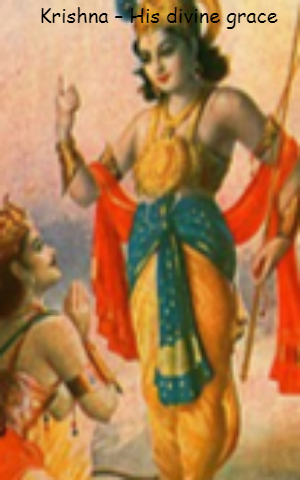Krishna – His divine grace
Krishna – His divine grace


Introduction
Krishna (Krsna in Sanskrit), is a major deity in Hinduism. He is worshiped as the eighth avatar of the god Vishnu and also the supreme god in his own right. He is a god of compassion, tenderness and love in Hinduism. Krishna’s birthday is celebrated every year by Hindus on Janmashtami according to Lunisolar Hindu calendar. The myths and legends related to Krishna have contributed to Indian aesthetics a major way. Krishna, after all, is the class rashika. A great god, Krishna, the mischievous child, the divine flute-playing lover and religious moral teacher. His teachings are often referred to as the Hindu world view(s). The anecdotes and narratives of Krishna life are generally titled as Krishna Lila (or Leela). His rasa relates to Lila of Krishna is the art in general, particular the theatre art. The rasa theory is mentioned in chapter-6 in ancient Sanskrit text Nityasashtra, attributed to Bharat Muni.
Philosopher and entertainer
Krishna became the focus of numerous bhakti cult, which over the centuries have produced a wealth of religion, poetry, music and painting. The basic source of Krishna’s mythology is the epic Mahabharata. He teaches people to renounce earthly pleasure and devote to him for full happiness. The real happiness is described in Bhagavad Gita by Lord Krishna to Arjuna.
We have often heard of Krishna’s rasa-lila with cowherd girls in Vrindavana. That is not like ordinary exchanges that take place between these material bodies. Rather it is an exchange of feelings through spiritual bodies. One has to be somewhat intelligent to understand what real happiness is, seeks happiness in material world.
Bhagavad Gita-2-
Bhagavad Gita is one of the greatest epics in the world, composed till date.
The famous Bhagavad Gita, which is one small section of the Mahabharata, presents a tussle between two contrary moral positions – Krishna’s emphasis on doing one’s duty, on one side, and Arjuna’s focus on avoiding bad consequences of war between the Pandavas and the Kauravas, on the other. Watching the two armies readying for war, profound doubts about the correctness of what they are doing are raised by Arjuna, the peerless and invincible warrior in the army of Pandavas. Arjuna is doubtful about the correctness of one’s duty only, which would cause to the misery and the slaughter, even of one’s kin. Krishna, a divine incarnation in the form of a human being (in fact, he is also Arjuna’s charioteer), argues against Arjuna. His response takes the form of articulating principles of action – based on priority of doing one’s duty, which have been repeated again and again in Indian philosophy.
Krishna’s hallowing of the demands of duty wins the argument, at least as seen in the religious perspective. Indeed, Ksrishna’s conversation with Arjuna, the Bhagavad Gita, became a treatise of great theological importance in Hindu philosophy, focusing particularly on the removal of Arjuna’s doubt.
Krishna appears to be the supreme of all creations in the world. His descent or appearance in this material world is to extinguish the fire of material existence for all living entities by setting forth the Dharma. He says in chapter 4(7-8) of Bhagavad Gita:
Yada Yada hi dharmasya glanir bhavati bharata
abhyuthanam adharmasya tadat manam srijanyaham
paritranaya sadshunam vinasaya cha duskritam
dharma-sansthapanarthya sambhavani yuge yuge
“Whenever and wherever there is a decline in religious practice, O descendent of Bharata, and a predominant rise of irreligion – at that time I descend Myself. In order to deliver the pious and to annihilate the miscreants, as well as to reestablish the principles of religion, I advent Myself millennium after millennium.”
This is the philosophy of Krishna. The transcendental chantings (sound vibrations) of “Hare Krishna, Hare Krishna, Krishna Krishna, Hare Hare. Hare Rama, Hare Rama, Rama Rama Hare Hare” helps human being to cleanse the dust from the mirror of the mind.
Last days
There is a mystery about the death of Krishna, the great god. After the death of all sons of Gandhari, Krishna called on her to offer his condolences. Feeling that Krishna did not deliberately put an end to the war, in a fit of rage and sorrow Ganddhari said Krishna should be slayer of his own kinsmen. According to the Mahabharata, a fight broke out at a festival of the Yadavas, who ended up killing each other. It is narrated, mistaking sleeping Krishna for a deer, a hunter named Jara shot an arrow, that fatally injured him. Krishna forgave Jara and left for His heavenly abode.
_______________________




























































